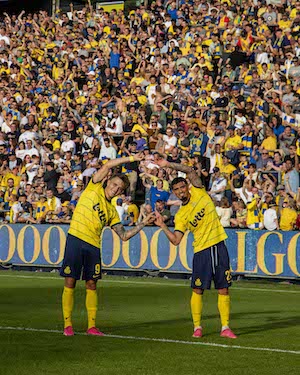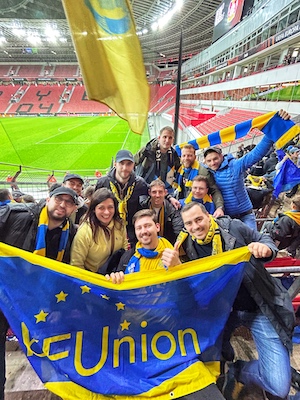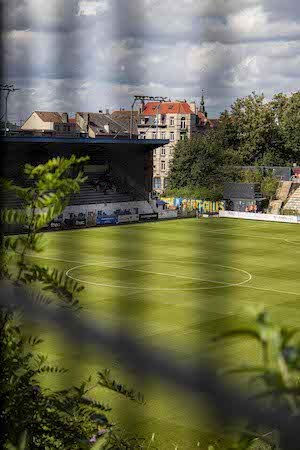It’s Saturday 4 June 2023. The summer sun blazes down on the approximately 9000 football fans in the sold-out Joseph Marien Stadium, nestled between a residential street and the towering trees of Duden Park in Brussels’ Forest neighbourhood. It’s the last match of the season in the Jupiler Pro League, Belgian football’s highest division.
The players and supporters of the home team, Royale Union Saint-Gilloise (RUSG), look set to be rewarded with the league title. They narrowly missed out on the top spot the previous season and so, if they pull it off, it will be their first in 88 years.
It’s all going to plan until the 89th minute, when the drama takes its pitiless course. Within these final moments, Club Brugge score three goals, and Union lose the match that was supposed to make them champions.
Some players later describe the last-ditch 1-3 defeat as traumatising and cruel; others as something they hope to never relive. But even when the disappointment is palpable, the yellow-blue crowds remain. The team and coach make their way to the main stand, the so-called Tribune Est, home of RUSG’s fan clubs and its most loyal supporters. As after every match, one player leads the chant, and everyone joins in: “Bruxelles, ma ville, je t’aime …” (“Brussels, my city, I love you …”) and then, as is tradition at the end of a season, the fans are allowed to invade the pitch.
It’s precisely this special relationship between the team and its fans that got Ana Ascenção e Silva hooked from the very first fixture she attended. That was in April 2017, when the now 37-year-old from Portugal, a team leader for communications on global emergencies in the European Commission, witnessed a draw between Saint-Gilloise and Standard Liège.
 Photo by Myrthe Van Looy
Photo by Myrthe Van Looy
Ascenção e Silva, a long-time supporter of FC Porto in her homeland, was not new to football. “I started going at the age of three, with my grandfather,” she says, “and I missed it when I moved to Brussels. A friend convinced me to go to see Union, but I didn’t think it would be worth it compared with what I was used to. I remember they didn’t win, they didn’t even play well, but to my surprise, everyone was celebrating.”
Today, she is the co-founder and president of bEUnion, one of nine official RUSG fan clubs. Since its launch in 2021, the year the team returned to the top division after 48 years of absence, bEUnion has gained more than 350 members. As the name suggests, there is a clear connection to the European Union.
“All founding members worked – or are still working – in the EU institutions,” explains co-founder Daniel Perez, an assistant in the European Parliament. “We wanted to reflect what binds us together. The idea was to create an anchor point for people in the EU bubble who want to go to a football match but don’t know which club to choose or how to get tickets. Everyone who is like-minded can join, no matter the cultural or professional background,” he says.
Like Ana, Perez was sold on the club from his first game six seasons ago. “People just wanted to have fun, sing along, and have a good time,” he says, “and after the match, we had a few beers with the players. I loved the familiar atmosphere.”
Even now that the club has been a close contender for the league title for two consecutive seasons and is playing in the UEFA Europa League for the second year in a row, this feeling remains, and continues to be the major point of attraction for locals, newbies and groundhoppers alike. “It’s a place for football romantics,” Perez says.
A significant part of the appeal is the historic stadium, inaugurated in 1919, which has played a major part in forging the club’s unique identity. With its heritage-listed art deco facade, it is one of the very few grounds located in the middle of a city. Despite recent renovations, it lacks modern infrastructure, which is why Union is forced to play its European matches elsewhere. But the Marien, as locals affectionately call it, has kept its particular charm. During matches, younger children sit on the barriers, dangling their feet above the pitch, and afterwards some players use the street exit to walk home, passing the iconic Union’s Taverne football bar, chatting and snapping pictures with fans.
Tied into daily community life with its clubhouse open five days a week, the Marien is deeply rooted in the largely working-class neighbourhood. Yourek Dury, a 54-year-old cinema location manager, spends every free minute at the clubhouse: “It’s my second home,” he says, referencing a line from one of the club’s historic fan chants: “Le Marien c’est ma maison.” Yourek, who is full of anecdotes, such as the one where a player took his beer and downed it before shooting a corner, has been coming to Union matches for 44 years now, and has experienced all the ups and downs from the fourth division to today.
For longstanding fans like him, the recent changes are a lot to process. “It’s a strange feeling. I’m very happy about the success and it’s amazing how everything is becoming more professional, but there are dimensions that disappear,” Dury concedes. “I came here when there were only 50 to 200 people at a match, and you could just turn up and buy a ticket at the door. But you can’t have everything, and I will never wish for my team to fail.”
 Photo by Myrthe Van Looy
Photo by Myrthe Van Looy
Is he worried that, with the rising attention, success, commercialisation, and talk of a new Europa League-standard stadium, what makes Union so special could be lost? His answer is a clear no: “The Union spirit is deeply ingrained in the DNA of the club and its fans. We never sing against other clubs, we’re anti-fascist, everybody is welcome, and there is a family-like simplicity,” he says. “We weren’t part of the wild hooligan period in the 80s and 90s, so it’s always been a refuge for those who don’t like that stuff. It goes back a long time, and it’s something we’re trying to preserve.”
Italian-born Ignazio Cocchiere, a former parliamentary assistant and current policy officer for sports in the European Commission, has also closely witnessed the extraordinary trajectory of the club, first as a player, then as a spectator. Beloved by fans as the person who saved the club from descending once again to the fourth division with a pivotal goal in the 94th minute back in 2013, he’s one of the few players with their own dedicated song – “Viva Ignazio, il préfère le stoemp aux pâtes au pesto!” (“Long live Ignazio, he prefers stoemp to pesto pasta!”)
Having played for RUSG from 2013 to 2016, it comes as no surprise that he has kept close ties with the club: “It’s easy to say it’s special, but I can tell you, it’s true – on and off the pitch. I played in different countries and teams, and to have this kind of familiar aspect on a professional level is really unique,” he says. “After the game, we would meet with supporters in the clubhouse to chat and have a drink, and it didn’t matter if we won or lost.” With his background, he is, of course, also a member of bEUnion, and tries to attend matches whenever he can.
 Photo by Myrthe Van Looy
Photo by Myrthe Van Looy
Currently, bEUnion is the club’s fastest-growing supporter club – a fact that earned them a meeting with RUSG president Alex Muzio. As Perez explains: “We founded the club just after Union had returned to the first division, so we profited from the team’s success. Plus, we filled a bit of a gap as the only fan club with English as the main language, and we managed to engage with a lot of people by being very open to new members.” It offers a sense of community, he adds. But why found a fan club at all, when you could simply join one of the many existing ones? “We saw a huge potential for new members from the EU bubble,” he says, “and we wanted to have a say and sit at the table.”
The relationship between the club and its fan groups is a good one, and one the club is eager to maintain, for example through monthly get-togethers with the respective fan club boards.
“We want to listen to the supporters as much as possible and I believe that’s key,” says Muzio, who took over in 2018, when Brighton & Hove Albion owner Tony Bloom became the RUSG’s majority stakeholder. The arrival of the two Englishmen goes hand in hand with the club’s recent revival of Union Saint-Gilloise’sits glory years of the early 20th century, when RUSG won 11 league titles.
But although the new duo have invested money, it hasn’t been on a game-changing level, and the club continues its low-budget approach with significant salary caps for players. Its budget for the first season back in the top division was €11m, compared to the €90m spent by Club Brugge, for instance. Despite the financial disadvantage, RUSG finished the season at the top of the league before the playoffs, the first club in Belgian history to do so directly after promotion to the top flight.
Instead of relying on big money, Union has made a name for itself in the football world for its innovative recruitment strategy – often compared with cult movie Moneyball, an underdog story about an American baseball team that uses a data-driven approach to beat the heavyweights. Still, Muzio plays it down. “There are many different elements,” he says. “You can’t just open a spreadsheet and go, ‘Find me all the best players and put them all in the team.’ It doesn’t work like that; you’d end up with chaos. There’s a lot more to it. You need a certain mix of personality, of culture.”
In a football universe that is increasingly ruled by big money, RUSG with its old fashioned stadium, unique fan culture and original approach, appeals to those who miss the football of yesteryear, and consciously choose it over internationally well-known local rival RSC Anderlecht, Belgium’s most successful club with a record 34 league titles.
In the meantime, the fairytale continues. On 5 October, the eyes of the world will be on the little club from Brussels, when it takes on the legendary Liverpool FC in the group stage of the UEFA Europa League. “I remember watching our amazing penalty save against Tubize five years ago, to keep us in the second division,” says Muzio. “The distance from that moment to Anfield is pretty enormous.”
Of course, bEUnion’s Daniel Perez and Ana Ascenção e Silva will be in Liverpool for the match – together with 148 other bEUnion members, cheering for their team no matter if they win or lose.
Sign up to The Parliament's weekly newsletter
Every Friday our editorial team goes behind the headlines to offer insight and analysis on the key stories driving the EU agenda. Subscribe for free here.